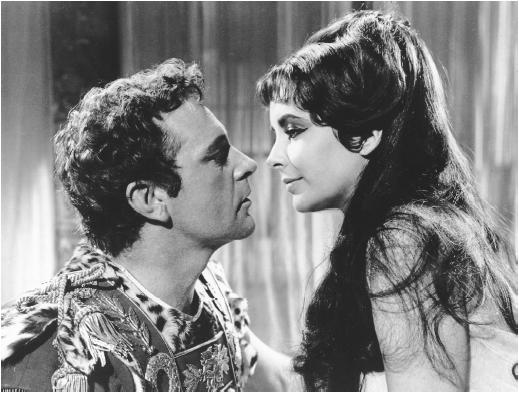Textuality » 4A Interacting
Now I’m going to analyze Antony and Cleopatra’s tragedy, from Act I, Scene 1 and Act II Scene 2, to understand how the characters are represented and their function in order to understand their behaviours. At the end of my analysis I’m going to give a positive or negative connotation of Antony and Cleopatra’s relationship.
First of all I’m going to analyze Antony’s character.
The tragedy starts with the dialogue between Philo and Demetrius who are Antony’s party. In the first exchange of Philo, he tells his friend about the strange behaviour of their general (“the dotage of our general’s”), he defines his dotage like something that “o’erflows the measure”, to make understand the reader, how far the Egyptian queen has seduced their strong leader, that once “in the scuffles of the great fights hath burst the buckles on his breast”, now, instead, he has become “the bellows and the fan to cool a gipsy’s lust”. With Philo’s description, comes out Cleopatra’s bad influence in Antony and her bad reputation, as a matter of fact she is described like a whore, that her only purpose is seducing men (“gipsy’s lust”). The intelligent reader may understand, in a certain sense, Cleopatra as the prototype of a seducer, as a matter of fact, at the beginning she subdues Antony appealing to feelings, when she sees the lie of the land, she sets out again to jump on Antony’s integrity, in order to make him her mental slave who complies with Cleopatra’s orders, I venture to say like a faithful doggie. Antony is deeply attracted by her insomuch as he didn’t do his duty, which is fighting with the Egyptian. The Antony’s semantic words are body, eyes, heart which are usually used to recall words to characterize a woman, not a strong leader (man). Instead Cleopatra’s semantic words are tawny front, which recalls the head, the brain, the mind, which are used to make the reader understand the intelligence of Cleopatra, capable of exploiting her beauty, her sensuality and men’s stupidity to reach whatever she wants. She was able to make become Antony a toy in her hands.
Now I’m going to analyze Cleopatra’s character.
In the Act II Scene 2, there is a dialogue between Enobarbus (who is Antony’s party) and Agrippa (who is Cesar’s party) in which they are talking about the Egyptian queen. In the first exchange, Enobarbus tells Agrippa that Cleopatra was “sat in the barge, like a burnish’d throne”. The intelligent reader, after considering the first Enobarbus’ exchange, may understand that there is a repetition of the same concept, which is fire, which recalls passion, love. As a matter of fact the fire semantic words are burnish’d throne, burn’d on the water, beaten gold, purple the sails. We may understand that Shakespeare has put in opposition fire and water, which fire represents passion (as I have already said) while water represents safety and femininity, to make Cleopatra more powerful than nature. Shakespeare doesn’t describe Cleopatra as the woman she is, but he describes the world surround her, he prefers an indirectly way, maybe because he wanted to give the reader the opportunity to create himself a mental idea of Cleopatra.
The simile, which lets to describe better something, “like a burnish’d throne”, is used to communicate the idea that the barge is the symbol for royalty, which is in that exchange underlined with the words: beaten gold, the oars were silver and even burn’d on the water. Another shade that, trough those words, comes out, is the idea of bright, which recalls fire. All that to make Cleopatra amazing, as a matter of fact in this way she becomes untouchable.
In all Enobarbus’ exchange everything is in excess, out of measure. So the intelligent reader may understand that when something is in excess, in that case love, it becomes negative, nearly dangerous for the health.
So Antony and Cleopatra’s relationship has a negative connotation because Antony is no longer able to chose with his own head, but he is subdued by the intelligent and beautiful seducer: Cleopatra, who makes Antony whatever she wants.
